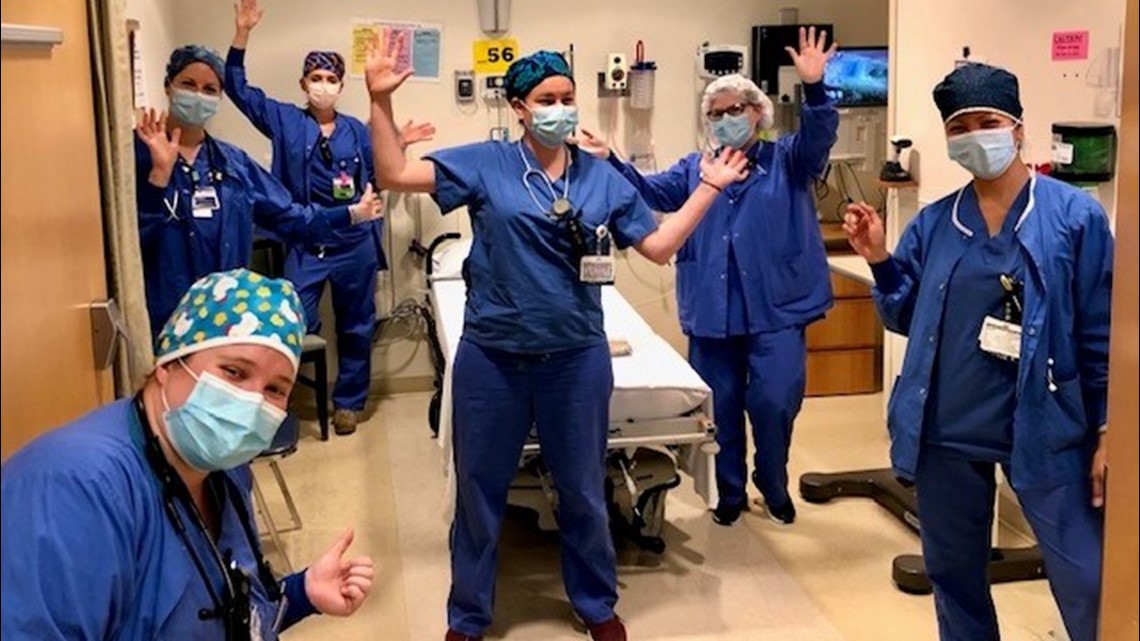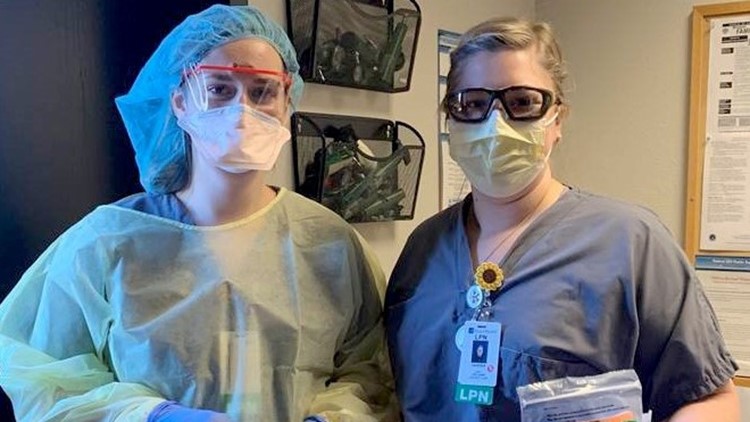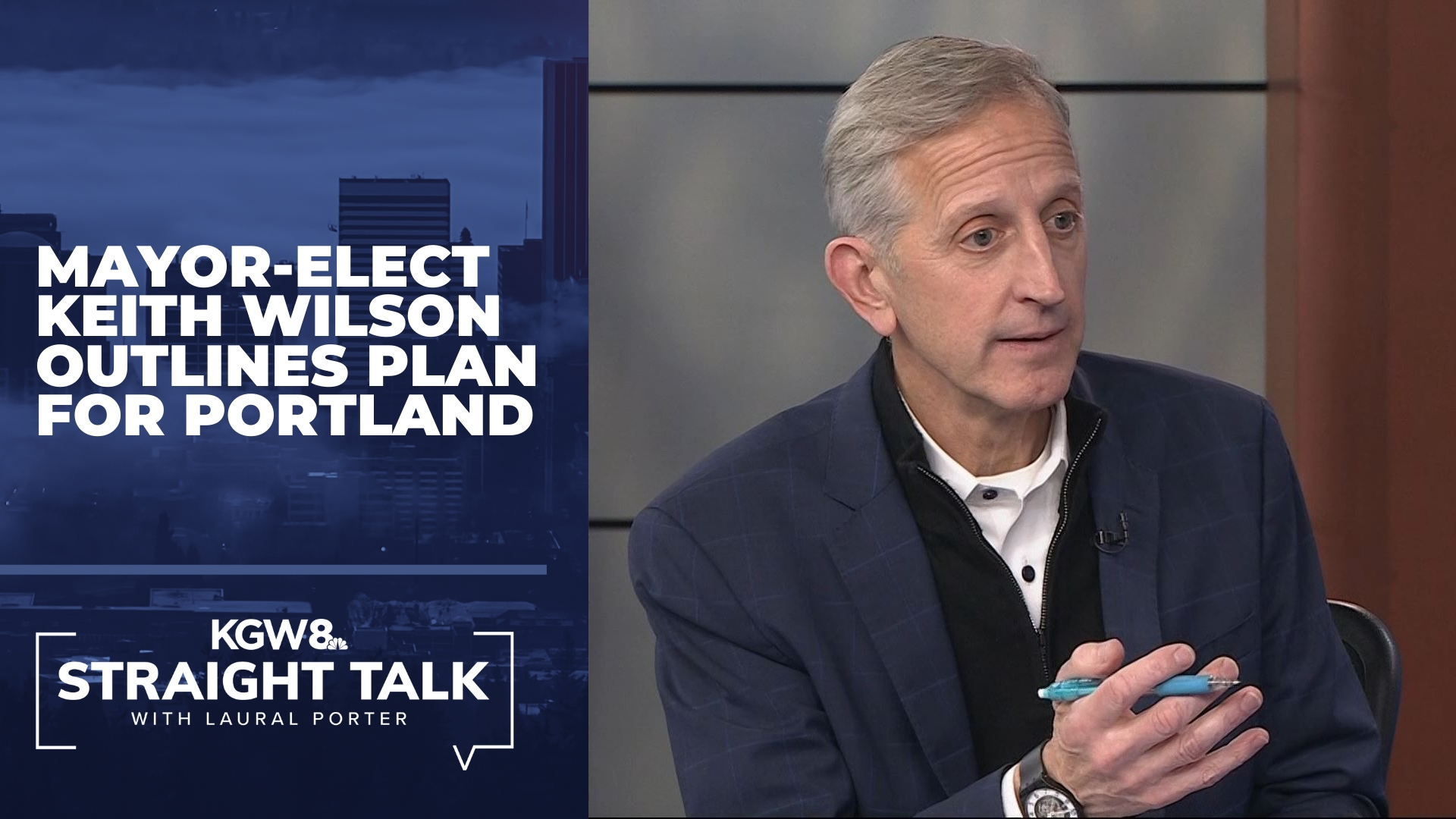PORTLAND, Ore. — Thousands of doses of the Pfizer vaccine against the coronavirus are expected to arrive in Oregon within days. Hospitals are busy working on their plans for distribution and who will get the vaccine first.
The CEO of the Oregon Association of Hospitals and Health Systems (OAHHS), Becky Hultberg, called the development of the vaccine extraordinary.
"It is really amazing that we are 11 months into this pandemic and we have a vaccine," she said. "I know this last year has felt incredibly long, but I just want to shout-out to all the scientists who worked on this."
"And to the Oregon Health Authority, and the folks at hospitals who are beginning to work on how they will distribute the vaccine," Hultberg said. "That's very exciting."
Hultberg, along with the chief executive of Providence Portland Medical Center, Krista Farnham, were guests on this week's episode of "Straight Talk."
Farnham said Providence could begin vaccinating some of its health care providers next week. She said she's confident in the safety and effectiveness of the Pfizer and Moderna vaccines.
"I have been assured by our infectious disease medical director, Dr. Justin Jin, that he will be first in line," Farnham said.
Farnham said the first health care workers to receive the vaccine at Providence will be those at highest risk and those who are providing direct patient care to COVID-19 patients.
Hope but a plea for continued vigilance against virus
Hultberg and Farnham expressed hope the vaccine will mean people's lives can begin to normalize in the near future.
"I think we have a lot of positive news on the horizon with the vaccine, so we have a lot to look forward to in the coming year, " Farnham said.
However, both Farnham and Hultberg stressed the importance that everyone continue the safe practices they’ve been using throughout the pandemic, as the vaccine begins to be distributed.
"It won't happen overnight," Farnham said. "So, we really need to continue our due diligence and taking care of our front-line workers, and we do this the best by making sure we continue to mask, social distance and wash our hands."
Concern about holiday gatherings
Health experts have expressed concern about the holidays and the desire for people to want to gather together to celebrate.
“My concern is we are going to let our guard down. And in letting our guard down, in having that one gathering, in going to that one event, we could have a very, very tragic and difficult January,” Hultberg said.
There’s hope on the horizon, she said, but asked people to tough it out for a few more months.
“We will get there and we want to get there together with as many lives saved as possible,” Hultberg said.
Oregon COVID-19 case numbers increasing
While many of the state's health care workers will be receiving the vaccine in the coming weeks, it may be months before the general public is vaccinated.
Meantime, Oregon is seeing its COVID-19 case numbers go up and the state's hospitals are mirroring what's happening across the country with a surge in hospitalizations due to the coronavirus.
Farnham said the Oregon Health Authority reported the week of Nov. 30-Dec. 6, hospitalizations due to the virus were up 24%.
She said Providence Portland has ranged from eight new COVID-19 patients a day to 20 new patients.
"To give that a little perspective, a typical nursing unit is about 24 patients," Farnham said.
"So, we've actually seen an increase in the course of one day, of an entire nursing unit here at Providence Portland Medical Center," she said.
Hospitals working to manage capacity
Hultberg, who works closely with hospitals throughout the state, said hospitals can handle the number of patients they have now, but they are watching the growing numbers closely.
"We have been very concerned about the rate of growth. That growth trajectory needs to change or we will be in a state of crisis," she said.
She said case numbers have plateaued slightly in the last week, which she said is good news if it lasts.
"That is really hard to sustain and those numbers can change very quickly," Hultberg said. "So, we cannot take even a small plateau for granted. We have to continue to be vigilant."
Hultberg pointed out that enough beds doesn't necessarily mean there is enough staff to take care of patients in them.
"At the beginning of the pandemic, we were thinking about things like PPE and physical space. Now the real issue is staffing," she said.


At the start of the pandemic, hospitals could bring in staff from other parts of the country where there weren't many COVID-19 cases, but that's changed now, with most areas of the country seeing a surge in numbers.
"Those staff are not available. We have to manage this with the resources and staff we have in the state right now," Hultberg said.
If hospitalizations continue to go up, Hultberg said more hospitals may have to eliminate elective surgeries, which some have done already.
At Providence Portland Medical Center, surgeries have been dramatically reduced. They are now limited to emergent and urgent surgeries only.
Farnham said that could be adjusted if demand for acute admissions goes down. However, if more COVID-19 patients are admitted, then, she said, the hospital will have to decrease the number of surgeries.
Gov. Brown proposes deep funding cuts for hospitals during pandemic
In her budget proposal for the next biennium, Oregon Gov. Kate Brown proposed hundreds of millions of dollars in cuts to programs that support hospitals.
She said with the devastating wildfires earlier this year and the economic fallout from the pandemic, she had to make hard choices. She said the additional 140,000 Oregonians joining the Oregon Health Plan created a more than $400 million budget gap.
“Let me be very clear. This budget doesn’t put enough money into our schools," Brown said. "It doesn’t make the investment in public health that we need. It’s a budget built on sacrifice and hard choices."
Hultberg said the governor’s budget doesn’t require universal sacrifice, but sacrifice from just a few areas, including hospitals. She called the governor’s budget the wrong approach during a once in a lifetime public health emergency and said now is the time to have a state budget that provides funding for strong hospitals.
“It is the absolute worst time to cut hospital budgets,” Hultberg said.
Brown’s budget is just her proposal and must still go through the budgeting process in the Legislature that could take months.
Hultberg said the OAHHS is having conversations with legislators, encouraging them to support hospitals during the pandemic, especially hospitals that provide care for vulnerable populations.
“We hope at the end of the day and the end of the process, the budget will recognize supporting hospitals in a pandemic is critical,” Hultberg said.
Health care workers stressed
The ongoing months-long pandemic has taken a toll on the nation’s health care providers who are providing not only direct care and hospital support for COVID-19 patients, but also dealing with the stresses everyone else is facing in their personal lives.
Oregon Health Clinic critical care physician, Dr. Rhett Cummings told KGW recently, it’s been taxing.
“I wouldn’t be telling you the truth if I didn’t say that I suffer from a certain degree of burnout,” he said. “I personally have to remain really diligent about what I do when I’m not at work and trying to take care of myself so I can come back to work and be the best doc I can be for those folks.”
Hultberg said they’re hearing that from health care workers throughout Oregon and across the nation.
“We have asked them over and over and over again to show up for their patients, and they have, and we are tremendously grateful for that,” she said.
Hultberg and Farnham agreed the best way to support the nation’s health care workforce is to do everything possible to prevent the hospitals from being overwhelmed.
Heralding 'Health Care Heroes'
Farnham called the staff at Providence Portland Medical Center “heroic.” She thanked the infectious disease experts who have guided the hospital through the pandemic, the emergency room department and staff in critical care who have seen incredible challenges, and the inpatient staff who have stepped up to take care of the community.
“I am humbled to work with such expertise and compassion,” Farnham said.


In a Dec. 1 letter to PPMC staff, Farnham expressed her gratitude, but also said much more will be asked from them in what may be difficult days ahead. She ended her letter with lines from the beginning and ending of a prayer attributed to Hopi elders.
“You have been telling people that this is the Eleventh Hour, now you must go back and tell the people that this is the Hour.
And there are things to be considered.
All that we do now must be done in a sacred manner.
We are the ones we’ve been waiting for.”
She ended her letter with her own words.
"We have been preparing for what is to come. It will not be easy. We will continue to do everything in our power to care for those in our community who are coming to us in need.”
Farnham said in the beginning of the pandemic, the community showed great support for health care workers calling them “heroes,” for which she said they are extremely grateful. Now, she asked the entire community to be their heroes by continuing to wear masks, social distance and wash hands.
Hultberg said by continuing those preventative measures against COVID-19, and with the vaccine on the way, “there is light at the end of the tunnel.”
Straight Talk airs Friday at 7 p.m., Saturday at 4:30 p.m., and Monday morning at 4:30. Straight Talk is also available as a podcast.



